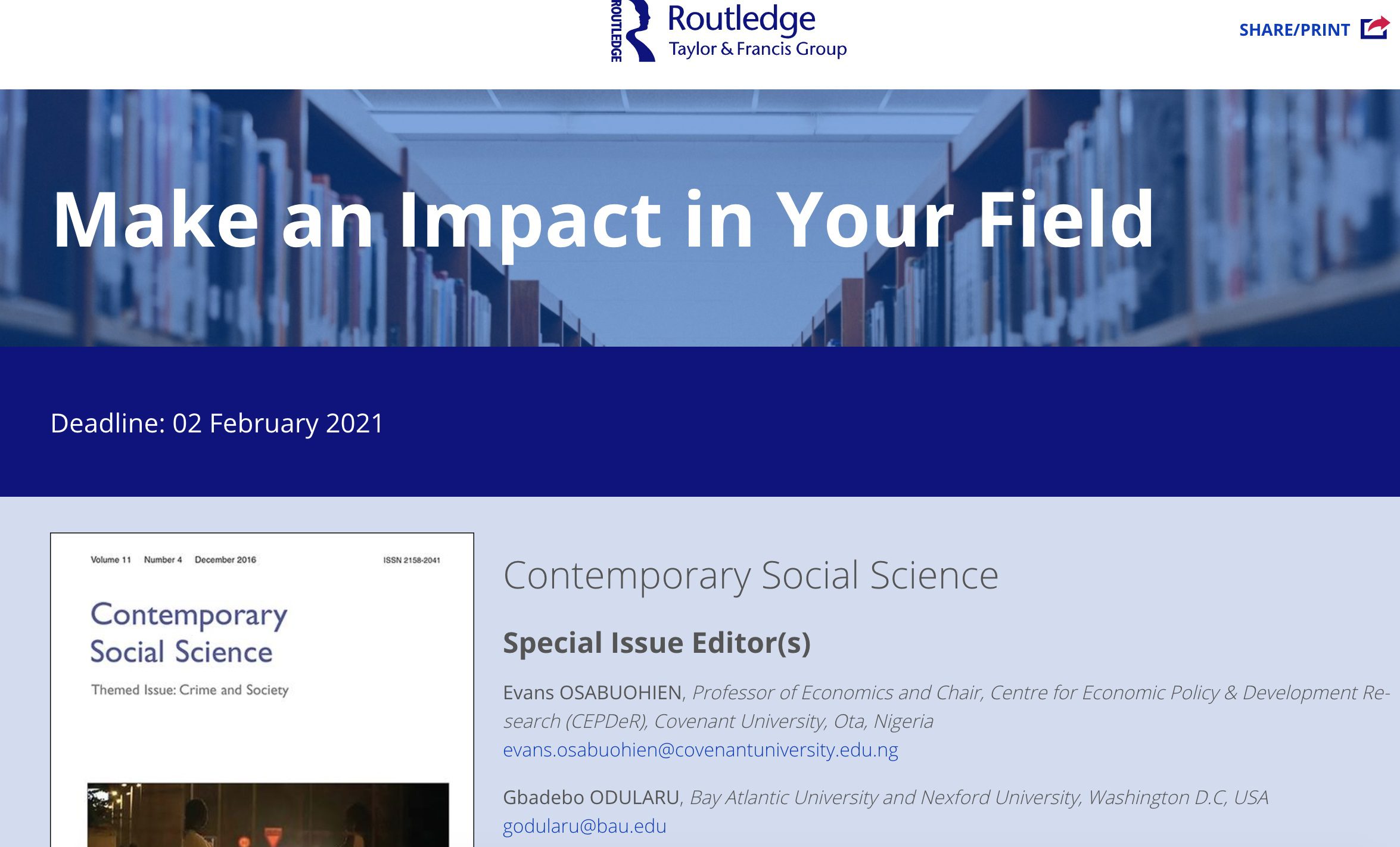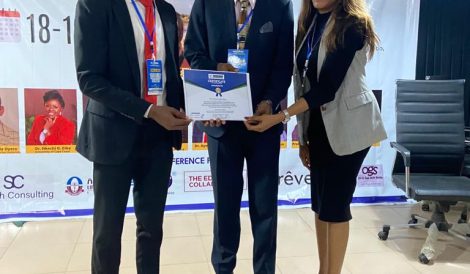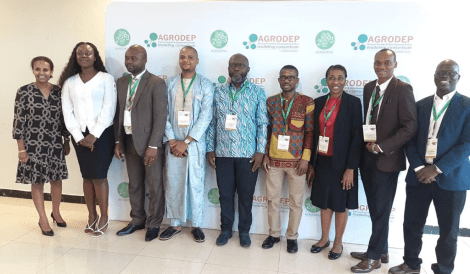Prof. Evans Osabuohien
- Posted on
- No Comments
Call for Paper in CSS Special Issue (Socioeconomic Shocks, Inequality and Food Systems in the Global South)
Background and Problem Statement
After more than a decade of global growth, worldwide, including within the African continent, the novel coronavirus (COVID-19) pandemic that began to spread in the first quarter of 2020 rampantly, brought most countries around the world to a standstill. Many countries worldwide are experiencing aggravated socioeconomic shocks that are aggravated by COVID-19. Globally, the health crisis has further exacerbated food insecurity, inequality and poverty for households, especially for countries in the Global South. Despite the devastating impact of COVID-19 on vulnerable communities in the Global South, there are opportunities for rethinking the growth and development paradigms that can deliver more resilient, sustainable growth and development prospects for households and societies. New and emerging data reveal that the effects of the lockdowns foster systemic inequality through the loss of household incomes and employment opportunities for marginalised segments of the population. Accordingly, the adoption of more inclusive growth and development paradigms for the Global South, notably countries in Asia-Pacific, Latin America & the Caribbean as well as Africa, becomes paramount.
The global community continue to strive for means to tackle the myriad of challenges that are posed by the socioeconomic shocks (e.g. COVID-19 pandemic, among others). Many countries in the Global South have also begun to muster the needed apparatus to develop resilience to address the complex challenges of inequality, poverty and food insecurity amidst constrained resources. The situation challenges governments and non-governmental organisations (NGOs) to explore efficient and effective pathways to channel food items, medical supplies and other support services to where they are most needed—thereby showing the need to combat food supply chain disruptions and logistical bottlenecks. There is a need for more comprehensive documentation of the evidence-based policy measures and programmes that are designed for wealth creation, jobs generation, youth employment, food and nutrition security and post-COVID-19 socioeconomic recovery; subsequently, bolstering the resilience of households and societies against future crises.
Aim and Objectives
The proposed Special Issue aims at exploring the nature and effects of food security challenges and inequality complexities, as well as evidence-based measures that have been implemented by governments and NGOs. To address these socioeconomic shocks in the Global South, this Special Issue offers an in-depth understanding of the critical societal consequences of the devastating pandemic, as well as, the examination of a macroeconomic policy instituted by governments and development partners to boost post-COVID-19 recovery prospects. Also, it provides an opportunity to understand and explicate the above issues across various critical sectors and countries in the global South.
Sub-themes
The following sub-themes will guide the Special Issue in achieving its objectives:
- Socioeconomic shocks, food security and income inequality in the Global South;
- Disruptive effects of COVID-19 and food systems challenges in the Global South;
- The socioeconomic pressures due to the effects of the changes in food prices on the national budgeting process in the Global South;
- The coping strategies and the opportunity costs of the broad disruptive impacts of socioeconomic shocks on households’ livelihoods in the Global South;
- Social, economic and security complexities of food shortage and inequality across selected countries in the Global South;
- Hindrances of socioeconomic shocks on food supply and value chain development in the Global South;
- Socioeconomic shocks, agricultural sector performance and gender inequality in the Global South;
- Evidences and lessons from post-COVID-19 pandemic paradigm shift in food systems in the Global South.
In addition to the above-listed sub-themes, other relevant issues that are related to the broad topic are welcome.
Target Audience & Relevance
This Special Issue will benefit a broad range of audiences, including scholars, policymakers, international agencies in the global South. It will comprise of innovative ideas to contribute to the expansion of the frontiers of knowledge as required by various institutions, such as international development agencies, with respect to socioeconomic shocks, inequality, and food systems in the Global South.
Mode of Submission
The Guest Editors, welcome original articles, including quantitative or qualitative studies, case studies, or critical reviews, dealing with aforementioned issues that should be related to analytical/conceptual framework in social science disciplines. Manuscripts should follow the normal instructions for electronic submission of papers to Contemporary Social Science. Authors should indicate that they wish their manuscript to be reviewed for inclusion in the Themed Issue. According to the publisher of the Journal (Taylor & Francis), there are NO submission nor publication charges for articles published in Contemporary Social Science. The editors of this issue would be happy to review the plans for papers in advance of their receipt. All papers will be peer reviewed.
The closing date for the online submission is 2nd February 2021.
Outcome
The outcome of the Call for Special Issue has been published as Socioeconomic Shocks, Inequality and Food Systems in the Global South
Brief Profile of the Editors
Evans OSABUOHIEN is a Professor of Economics, Covenant University, Ota, Nigeria. He has been recognised as One of the 6 Youngest Professors in Nigeria. He is the Pioneer Chair, Centre for Economic Policy and Development Research (CEPDeR) as well as Regional Centre of Expertise, Ogun State (RCE Ogun). He is an Alexander von Humboldt Visiting Professor, Witten/Herdecke University, Germany, and a Visiting Scholar, University of Economics Ho Chi Minh City, Vietnam. He has published two books and over 120 scholarly articles. He is a Guest Editor for African Journal of Economic and Management Studies. He is a member of numerous professional associations, a reviewer and editorial board member for many journals [[email protected]; p[email protected]]
Gbadebo ODULARU is affiliated with Bay Atlantic University (BAU) Socio-Economic Research Applications & Projects (SERAP), and Nexford University (NXU), Washington D. C, USA. He holds a doctoral degree from the University of Sunderland, UK. He was formerly a regional policy and markets analyst at the Continental Forum for Agricultural Research in Africa (FARA), Accra, Ghana. In addition to his great passion in advancing the frontiers of knowledge, he currently collaborates with domestic and international partners and governments to provide evidence-based policy and implementation tools for enhancing post-COVID-19 socioeconomic recovery amongst vulnerable communities [[email protected]]
Daniel UFUA is a lecturer in the Department of Business Management and a Research Fellow at the Centre for Economic Research and Policy Development (CEPDeR), Covenant University, Ota, Ogun State, Nigeria. He holds a Masters and PhD in Management Science from University of Hull, UK. His core research interest is on systems thinking and general management studies. He has a preference for the use of systemic intervention and broad stakeholder engagement as a key methodology for his research practice. He has published several research materials on international outlets, some of which were produced independently and others on collaboration with his colleagues [[email protected]]
Darline AUGUSTINE is an Associate Professor of Business Management at the Koppelman School of Business, Brooklyn College, at the City University of New York (CUNY), USA. She holds MSc and PhD degrees from the London School of Economics and Political Science (LSE), UK. At the core, her research focuses on business and society. Dr Augustine’s research topics include, but are not limited to, financial sector development, corporate governance and entrepreneurship management to create impact for sustained, enhanced livelihood, growth and development [[email protected]; [email protected]]
Romanus OSABOHIEN is a Lecturer in the Department of Economics and Development Studies and a Research Fellow, Centre for Economic Policy and Development Research (CEPDeR), Covenant University, Ota, Nigeria. His main research focus is on Social Security, Food Security, Agricultural and Development Economics. He has attended and presented research findings in both international and local conferences/workshops and has published peer-reviewed papers in rated journals. He is also a reviewer for many journals.




